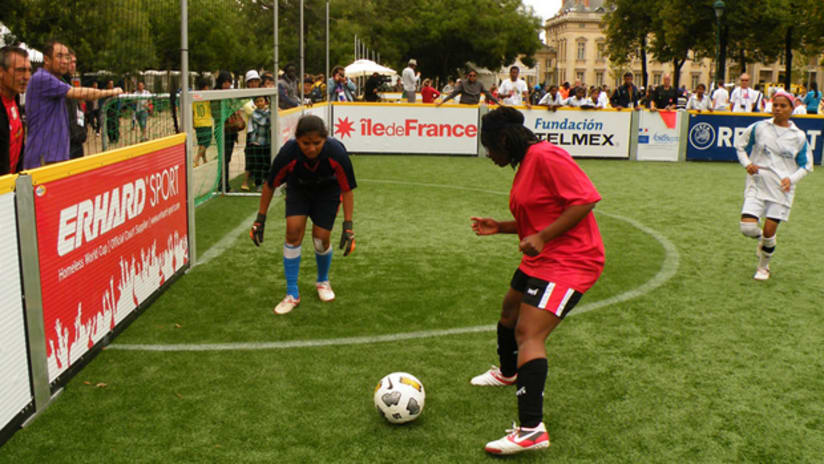After weeks of preparation, training, and spending some quality time with members of Vancouver Whitecaps FC, the Canadian men’s and women’s soccer teams could not wait to embark on their European journey to compete in the 2011 Homeless World Cup in Paris, France.
This year's instalment of Canadian athletes made their way across the Atlantic Ocean for the eight-day soccer competition (August 21 to 28) in hopes of representing their nation through excellence in sport. The end result? Mission accomplished.
On August 20, the official 2011 Homeless World Cup draw occurred to select the fixtures and groupings for the tournament. The draw saw Canada’s men placed into Group C of the Preliminary Round against Italy, Mexico, Nigeria, Palestine, and South Korea. Canada’s women were placed into Group B of the Preliminary Round against Argentina, Brazil, India, Malawi, Norway, Uganda, and the United States.
CANADIAN MEN
Throughout the Preliminary Round, Canada experienced some highs and lows. They finished their round-robin campaign with a record of 1W-4L-0D. Canada defeated South Korea 6-2, but struggled against the other four teams in their group, falling 8-4 to Italy, 11-0 to Nigeria, 9-1 to Mexico, and 12-1 to Palestine. After the Preliminary Round was completed, the top three teams in each group advanced to Section One of the Secondary Stage, while Canada and the remaining teams advanced into Section Two of the Secondary Stage.
With Canada advancing into Section Two, the 'Red and White' joined France, Greece, Hong Kong, Hungary, and Sweden in Group E. Canada’s performance throughout the Secondary Stage saw some good efforts, but unfortunately they went 0W-5L-0D in round-robin play after falling 8-2 to France, 4-2 to Hong Kong, 11-3 to Greece, 6-3 to Sweden, and 9-4 to Hungary. Canada was then placed into the 'INSP Networking' section of the 'Trophy Stage' portion of the tournament (41st to 48th position).
In the 'Trophy Stage', Canada joined Cambodia, Finland, Germany, Japan, Romania, Spain, and Sweden. Canada’s quarterfinal match against Germany saw them fall in a close battle by a score of 4-3, resulting in a move to the consolation side of the bracket. There, Canada would defeat Spain 4-2 to clinch a berth in the '5th/6th Place' match, where they would be narrowly defeated by Cameroon to finish 46th overall.
CANADIAN WOMEN
The Canadian women finished their round-robin campaign with a 3W-4L-0D record, narrowly missing out on a berth into the 'Women’s Cup' bracket, and instead, qualifying for the 'Women's Plate' portion of the tournament.
Canada joined France, Haiti, India, Netherlands, Paraguay, Uganda, and USA in the consolation bracket, which featured a quarterfinal, semifinal, and final format. Canada lost 5-0 to the Netherlands in the quarterfinal to join the losers' side of the consolation bracket. Their opponents in the semifinals were North American arch-rivals USA. Canada’s efforts against their regional foes saw them victorious in a penalty shootout after a 3-3 draw, which advanced them into the '5th/6th Place' match, where they were defeated in the final by India to place 14th overall.
A JOURNEY TO REMEMBER…
While Canada’s results at the 2011 Homeless World Cup will leave both squads wanting more, results are only a part of the entire purpose of the competition. The tournament, which started in 2003, seeks to provide an opportunity for homeless people to engage in physical activity, while also bringing global awareness about the problems and struggles faced in efforts to integrate them back into society.
Throughout the nine-year history of the competition, the tournament’s universal coverage has increased awareness and understanding about homelessness, which has seen the tournament grow drastically with each passing annual event. "To see homelessness and how it affects all ages…there’s 54-year-olds on this team who are getting their lives back through this game," Whitecaps FC midfielder Jeb Brovsky told MLSsoccer.com at a community centre in Vancouver’s Downtown Eastside. "It’s inspiring and it shows you that you’re never too old to make a change."
But for Canada’s participants, while raising awareness through the tournament helps change the worldwide perception of homelessness, their athletic competitiveness is a gift understood universally. Canadian men’s head coach Alan Bates writes, "This year's men's team is a quite different group of guys compared to last year. While last year's team was good at stepping off the pitch after a big loss with smiles on their faces, this year's edition of our squad knows they have potential to win games and is pretty disappointed when they don't. It's kind of a good example of how everyone's emotions are so tied to expectations."
It also shows that these athletes have more to offer then just the title of 'homeless' - a component that all too often goes overlooked.





